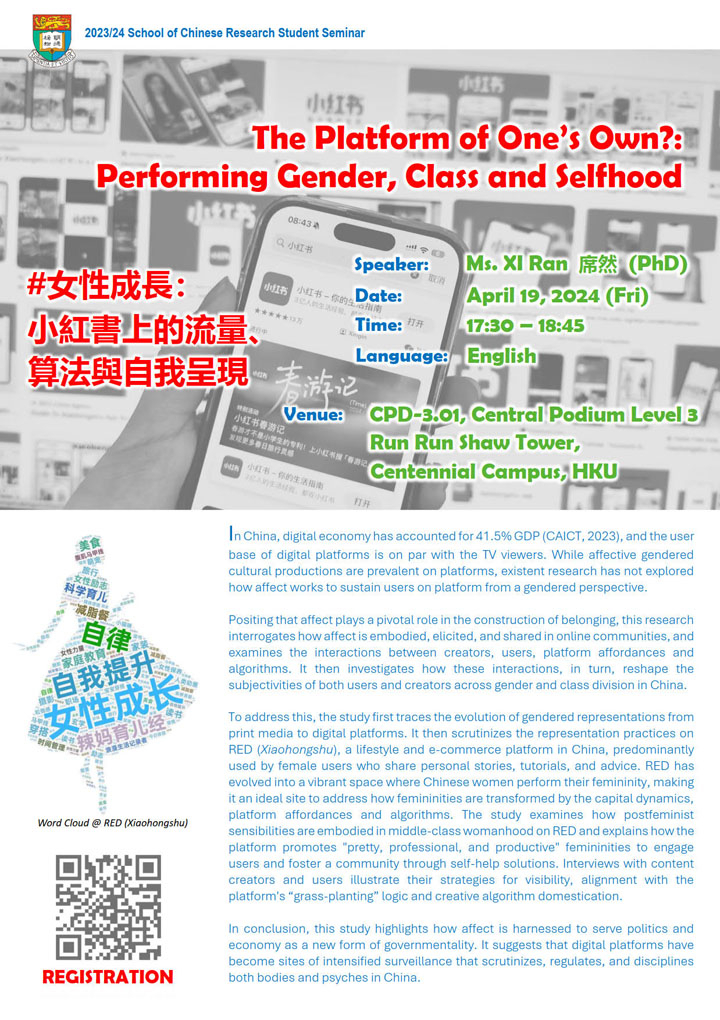女性成長:小紅書上的流量、算法與自我呈現 The Platform of One’s Own?: Performing Gender, Class and Selfhood

2023/24 School of Chinese Research Student Seminar
女性成長:小紅書上的流量、算法與自我呈現
The Platform of One’s Own?: Performing Gender, Class and Selfhood
Abstract:
中國數字經濟已佔GDP的41.5% (CAICT, 2023), 數字平台用戶數量已與電視觀眾數相當。雖然平台上性別化的文化產出豐富,但現有研究尚未從性別視角探討情感如何維繫平台用戶。本研究假設了情感在構建歸屬感中扮演的角色,試圖探討情感如何在線上社群中體現,引發和共享,並檢視創作者、用戶、平台功能和演算法之間的互動。然後研究這些互動如何反過來重塑中國不同用戶和創作者的主體性。
研究首先追溯了從印刷媒體到數字平台的性別展演。接著詳細審視了以女性用戶為主,分享個人故事及生活建議的社交平台小紅書,探討女性氣質如何被資本、平台及算法重塑。通過對小紅書上呈現的本土後女性主義風氣和中產階級女性身份構建的探討,解釋了該平台如何推廣“美麗、專業和高效”的女性形象來吸引用戶,並通過自助解決方案打造社群。通過採訪內容創作者及用戶, 探究了他們為了能見度及與平台的“種草”邏輯保持一致的策略,同时分析了她們如何馴化算法打造屬於女性的專有社區。
運用情動理論,闡明了情感如何加強社群實踐。研究強調了情感作為一種新的治理形式如何被用來服務於政治和經濟。同時指出,在中國,數字平台已成為對身體和心靈進行審視和調節的監視場所。
In China, digital economy has accounted for 41.5% GDP (CAICT, 2023), and the user base of digital platforms is on par with the TV viewers. While affective gendered cultural productions are prevalent on platforms, existent research has not explored how affect works to sustain users on platform from a gendered perspective.
Positing that affect plays a pivotal role in the construction of belonging, this research interrogates how affect is embodied, elicited, and shared in online communities, and examines the interactions between creators, users, platform affordances and algorithms. It then investigates how these interactions, in turn, reshape the subjectivities of both users and creators across gender and class division in China.
To address this, the study first traces the evolution of gendered representations from print media to digital platforms. It then scrutinizes the representation practices on RED (Xiaohongshu), a lifestyle and e-commerce platform in China, predominantly used by female users who share personal stories, tutorials, and advice. RED has evolved into a vibrant space where Chinese women perform their femininity, making it an ideal site to address how femininities are transformed by the capital dynamics, platform affordances and algorithms. The study examines how postfeminist sensibilities are embodied in middle-class womanhood on RED and explains how the platform promotes "pretty, professional, and productive" femininities to engage users and foster a community through self-help solutions. Interviews with content creators and users illustrate their strategies for visibility, alignment with the platform's “grass-planting” logic and creative algorithm domestication.
In conclusion, this study highlights how affect is harnessed to serve politics and economy as a new form of governmentality. It suggests that digital platforms have become sites of intensified surveillance that scrutinizes, regulates, and disciplines both bodies and psyches in China.








